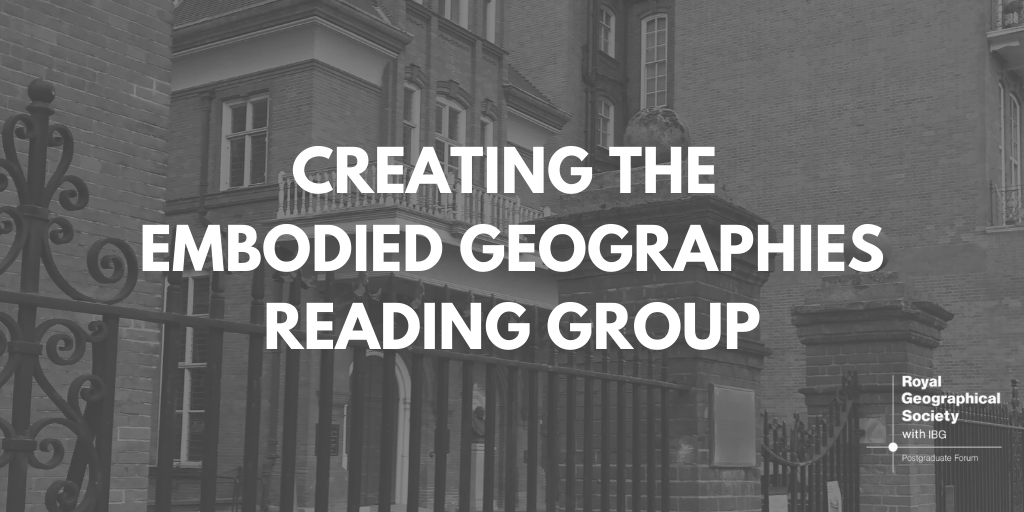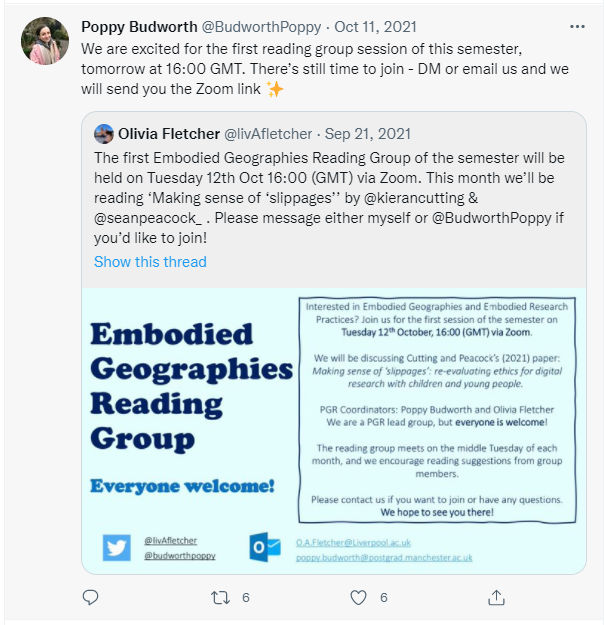
Olivia and Poppy share with us the joys and challenges of setting up and running an online reading group. Olivia Fletcher is an ESRC funded Human Geography PhD student at the University of Liverpool, researching young people’s use of self-tracking devices and the geographies of surveillance. Poppy Budworth is a Postgraduate Researcher in Human Geography at the University of Manchester, researching the multiple lived experiences of young ostomates in the UK. Poppy is also ESRC funded and has a CASE Studentship, partnered with GetYourBellyOut.
In February 2021 we, Olivia and Poppy, set up an Embodied Geographies Reading Group in the hope of connecting with Postgraduate Researchers outside of our respective Geography departments.
Disembodied beginnings
We both started our PhD’s at different universities (Poppy at The University of Manchester and Olivia at The University of Liverpool) in October 2020, which meant that we were six months into the COVID-19 pandemic with no sign of things going back to ‘normal’ when our Postgraduate research journey began. In November 2021, we attended the NWSSDTP Geography and Environment Pathway first year Zoom meet-up. This was a ‘get to know each other’ event, where we met with other new PGRs from across the DTP and engaged in a number of activities and discussions. Some of the common themes of discussion during this event was mitigating against social isolation during the pandemic, and the limited opportunities to meet PGRs/academics in meaningful ways.
Although we shared a supervisor (Dr Bethan Evans) who hosted the session, this was the first time we had met each other; after discussing our research we discovered we had similar interests. We both agreed that starting an online reading group based on one of these shared research interests could provide a much-needed space for people to come together. After meeting on Zoom for a couple of planning-based discussions, we decided on the theme of ‘Embodied Geographies’. A broad and interdisciplinary theme of embodiment was chosen, as we wanted to ensure the topic would appeal to people from various universities and (sub) disciplines, as well as allowing us to discuss both empirical and methodological literature.

Co-created care
We decided to set up the reading group as they offer a space to develop critical thinking skills through reflecting upon the author’s contribution to a body of work in a meaningful way. As well as this, reading groups encourage people to engage with different and exciting work outside of their field. Reading widely has meant we have encountered ideas, theories and authors that we may not have come in contact with, without this group. The discussions have been particularly useful when reading methodology papers, and this has contributed to the development of our own methodological designs. We noticed ourselves and other regular group members grew in confidence as the months went on, and we found it became easier to talk about the papers and about our own research to each other. Furthermore, talking together in a casual and encouraging reading group setting has helped in other more formal academic spaces, such as presenting at conferences, in our roles as graduate teaching assistants and when organising other events.

Most importantly, the reading group allowed us to develop friendships and keep connected during a pandemic. Organising the reading group together meant we developed a strong relationship which would have been difficult otherwise, due to working at different institutions. Our friendship has been supportive, encouraging and has positively impacted our experience of starting postgraduate research. As well as developing our own relationship, we have built strong connections with our regular group members. Once we started seeing the same friendly faces every month the reading group became a space where we socialised, reflected on PhD life, as well as discussed the paper in question. It was reassuring to hear that other people were facing similar challenges and encounters during their research, and strength came from knowing we were in it together. We purposefully chose papers that covered common experiences to facilitate more personal conversations about postgraduate research. Some of the more personal topics we covered included ‘ethical dilemmas’ and ‘imposter syndrome’. These conversations were very rewarding and we left the session feeling more confident about our work and ability to handle academic life.
Reaching out
As well as allowing us to have regular breaks from our PhDs, we now have experience organising online events using Zoom, communicating effectively with large numbers of people via email, and advertising events on Twitter. Twitter proved to be a useful tool in attracting new members and reaching the authors of the papers we were reading. We created a template tweet which we used each month; the tweet detailed the date, the time and the location of the event (Zoom), how to join the mailing list, we tagged the author and then added a screenshot image of the academic paper abstract. Advertising the reading group via Twitter each month meant we had gained lots of valuable experience using social media when it came to recruiting our own PhD participants. Using Twitter allowed us to connect with academics through tagging the authors in our Tweets. On a number of occasions this has started conversations with the authors and we have provided them with feedback from the group discussion.

After tweeting about the reading group session on video-diary methods, and tagging the author Dr Charlotte Bates, we were contacted by Charlotte who offered to attend the reading group for an author Q&A. We were delighted by this suggestion, and planned for the session to include a discussion with Charlotte about her work. The Q&A was a great opportunity for PGRs to connect with an academic and show interest in their work. In addition to discussing her own work, Charlotte asked the group about their research which gave members the chance to relate the discussion back to their PhD’s and their methodologies. This session was a personal highlight of the reading group, as it was clear that the space we had created was positively impacting those who were attending, and encouraged members to discuss their research with an academic who had contributed such valuable work to embodied methodologies.
Challenges
Although setting up and running the reading group has been a positive experience, with many people saying they value the space, it has not come without challenges. One of the main challenges for us was choosing readings that would appeal to people from various disciplinary backgrounds. We always asked our members for paper and chapter suggestions, and it was interesting to hear the different discussions and understandings of embodiment that emerged in the months we received suggestions. In the months where members did not come forward with suggestions, it often meant we chose similar readings, which we had come across in our own research. This was difficult, as it was important to us that the reading group covered a broad range of theories and approaches to embodied geographies.
We also found that timing was fundamental to the successful running of the group. We tried to stick to the penultimate Tuesday of every month at 16:00 (GMT) to encourage the involvement of people working in different time-zones. We constantly received feedback about what times and dates worked, with other responsibilities such as teaching and training sessions sometimes clashing. Tuesday afternoon seemed to work for a lot of people so we kept on with these timings for the first semester and were a little more flexible in the second semester. However, in the third semester (from January 2022), we found that the wider academic/world context was impacting quite significantly on group attendance. Due to the current context of negotiating hybrid working, strike action across universities, and the situation in Ukraine, people (understandably) have less capacity to attend online events. Attentiveness, flexibility and consideration are important skills to have when organising online events, and as a result, we decided to postpone the reading group until a time which feels more settled.
Branching out
As well as the author Q&A, starting the reading group resulted in us co-writing a number of blog posts (including this one!). Early in 2021, the NWSSDTP asked us to write a blog to advertise the reading group; this was a good way to reach new people across our DTP and connect with new people. Writing blogs together gave us insight into co-author processes and negotiations which are important aspects of academic writing and publishing. In addition to blog writing, in July 2021 we hosted a workshop with the NWSSDTP called ‘setting up and running events for PGRs’ with a particular focus on online events during COVID-19. During this workshop we drew on our experiences of organising the reading group with the hope of encouraging other PGRs to start their own group events. We stressed the value of connecting with people currently undertaking postgraduate research in informal settings, highlighting the benefits of building relationships, knowledge sharing and caring for each other within academia. We also included an activity where the workshop attendees were asked to design an event in breakout rooms, with the hope of inspiring more PGR-led groups. We were also able to offer advice to someone who had recently started their own reading group.
Meaningful connections
Overall, our experience of setting up and running an Embodied Geographies Reading Group has been positive. We are grateful for the meaningful connections we have made with PGRs from across universities and for staying connected during a difficult time. We have learnt a lot from others and our research has been strengthened through the skills we developed and the knowledge we have shared over the last year. If an event or group is missing in an area of research you care about, and you have capacity to do so, be the ones who take the first step! We would recommend working with peers and colleagues to organise events which bring people together, as friendships and informal care spaces within academia are invaluable when undertaking postgraduate research (and beyond).
If you want to join our mailing list for updates about when the Embodied Geographies Reading Group will next meet, please email Poppy Budworth or Olivia Fletcher.